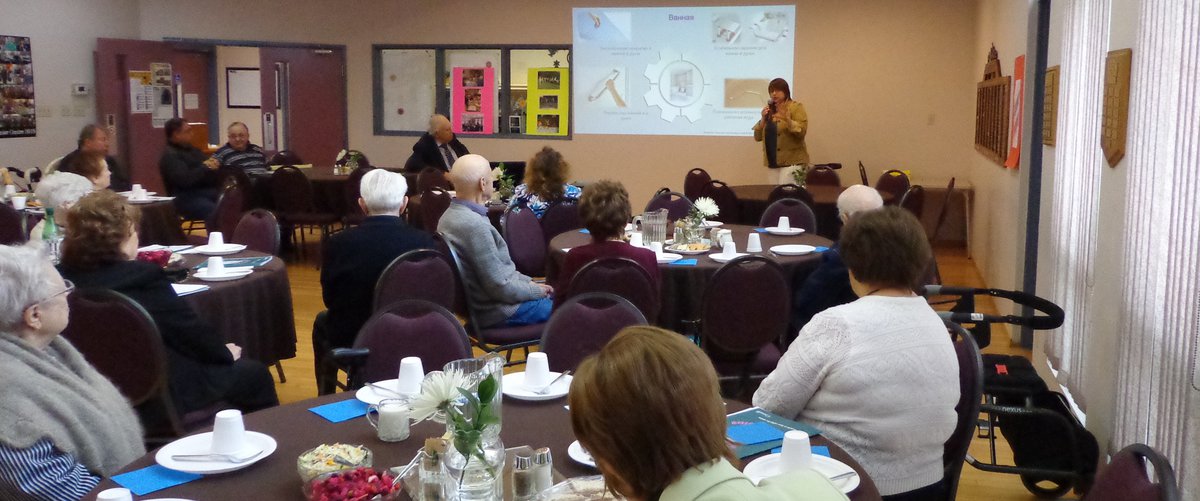Falls and seniors: a far-reaching, costly problem
It’s a fine line for older adults: The line between being aware of the risks of falling and avoiding physical activity, out of fear of falling.
Yet, despite the many, related public awareness campaigns targeted at seniors, warning of the risks and advising on ways to prevent falls, the messages frequently miss their target audience: one-in-three seniors aged 65 years and older are likely to fall at least once (Statistics Canada, 2014).
As the leading cause of injuries and hospitalizations of older adults, and a major risk factor for the transitioning of previously independent seniors to long-term care and assisted living, falls in seniors are estimated to have an annual health care system burden cost of $2 billion.
(Source: Final Report - EliHP - No Falls This Fall, or Any Other Season - Dr. Ellina Lytvyak; and Preventing Falls: From Evidence to Improvement in Canadian Health Care - A Collaboration From: Accreditation Canada/the Canadian Institute for Health Information/the Canadian Patient Safety Institute)
Falls remain the leading cause of injury-related hospitalizations among Canadian seniors, and between 20% to 30% of seniors fall each year. Falls and associated outcomes not only harm the injured individuals but also affect family, friends, care providers and the health care system. However, we do know that these personal and economic costs can be avoided through injury prevention activities.
(Source: Seniors’ Falls in Canada – Second Report
Public Health Agency of Canada)

Reaching out to vulnerable, foreign-born senior populations
With her Emerging Leaders in Health Promotion project – No Falls This Fall, or Any Other Season – Dr. Ellina Lytvyak identified a sector of seniors’ population that is deemed to have an even higher risk of falls, and that is vulnerable populations, including foreign-born seniors. This population often lives alone, with inadequate access to health care and experiences language barriers that prevent the understanding of health promotion efforts in a foreign language.
Dr. Lytvyak’s health promotion project targeted a population of seniors (65-95 years old) who:
- belong to Russian- and Ukrainian-speaking minorities
- live independently in the community
- may lack family and social support
- may experience financial difficulties
- may have physical disabilities.
Working with the president, staff and volunteers of the Russian Club (Jewish Senior Citizens’ Center) in Edmonton, Dr. Lytvyak designed a program consisting of four, center-hosted workshops in the winter, spring and summer of 2018.
With an emphasis on health and independence, the highly interactive workshops had a combined presentation/question-and-discussion format, as they sought to create awareness of falls as the important health issue that they are among seniors, particularly those living independently. Educational messages on the high preventability of falls were personalized for the workshop participants, tailored to their dwelling situations and their individual, routine daily tasks.
In addition to reviewing the latest data and statistics on falls in Alberta and Canada, the workshops outlined potential short- and long-term medical, psychological and social consequences of falls and resulting injuries, and emphasized the importance of physical activity, adequate vitamin D consumption and good nutrition/eating habits.
The No Falls This Fall, or any other season workshops were attended by 116 participants, who received brochures (with information about falls and prevention); posters (for at-home posting); personal assessments (using the Morse Fall Scale for Identifying Fall Risk Factors) and checklists (to assess potential fall hazards at home); and post-session evaluations.
Success means more of a good thing!
With the guidance of project mentor, Dr. Kathryn Koliaska (Associate Clinical Professor, Department of Medicine, Division of Preventive Medicine, University of Alberta), Dr. Lytvyak designed the workshops, developed the presentations and translated and adapted the educational materials, checklists and evaluation forms. Post-workshops, she analyzed and interpreted the results, reporting back to the project stakeholders and participants.
Based on survey results indicating that all or most respondents felt the information was relevant and presented in a way that would be useful in their day-to-day life, Dr. Lytvyak sees great potential for this workshop-based, fall prevention health promotion to continue.
“This project helped me to significantly improve and practice health promotion advocacy skills,” she explains. “It also helped me to learn more about the best strategies to reach the target audience; the integration of presentation, open discussion and real-life scenarios was very successful.”
About the ELiHP grant program
The Emerging Leaders in Health Promotion grant program provides funding to help medical students and resident physicians conceive and implement health promotion projects in support of the development of their CanMEDS/FM core competencies, particularly health advocacy.
Sponsored by the Alberta Medical Association, MD Financial Management, the Canadian Medical Association and its subsidiary, Joule, ELiHP projects facilitate the growth of physician leadership and advocacy skills in a mentored environment, while enhancing the well-being of the general Alberta population through education, advocacy and innovative care.

